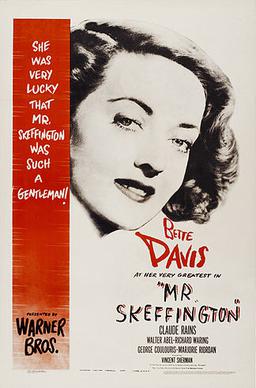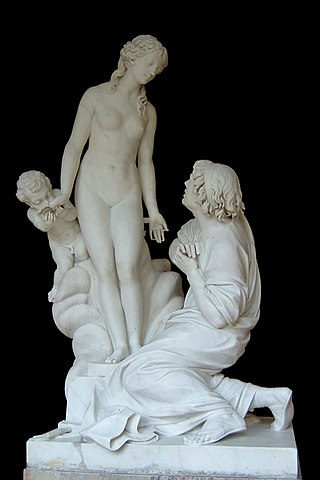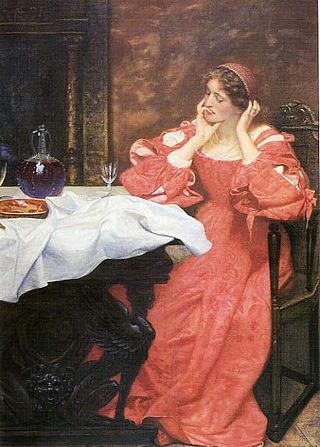Leandra is a genus of plant in the family Melastomataceae.
Leandra may also refer to:
The given name Leandra may refer to:
In fiction

Helen, also known as Helen of Troy, in Latin as Helena, beautiful Helen, Helen of Argos, or Helen of Sparta, was a figure in Greek mythology said to have been the most beautiful woman in the world. She was believed to have been the daughter of Zeus and Leda, and was the sister of Clytemnestra, Castor and Pollux, Philonoe, Phoebe and Timandra. She was married to King Menelaus of Sparta "who became by her the father of Hermione, and, according to others, of Nicostratus also." Her abduction by Paris of Troy was the most immediate cause of the Trojan War.
Clare may refer to:

Mr. Skeffington is a 1944 American drama film directed by Vincent Sherman, based on the 1940 novel of the same name by Elizabeth von Arnim.
Helen may refer to:

Galatea is a name popularly applied to the statue carved of ivory alabaster by Pygmalion of Cyprus, which then came to life in Greek mythology.

The R29 is a provincial route in South Africa that connects Johannesburg with Leandra and Kinross via Germiston, Boksburg, Benoni and Springs. For much of its route it is named Main Reef Road. The R29 used to end near the Golela border post, however the section from Evander to Ermelo is now part of the N17 and the section from Ermelo to the Golela border post just after Pongola is now part of the N2.

Paloma Cecilia San Basilio Martínez, known as Paloma San Basilio, is a Spanish singer, songwriter, producer and actress. She is a recipient of the Latin Grammy Lifetime Achievement Award for her valuable contributions to Latin music. She has sold over 16 million records throughout her career, with styles that range from melodic songs to pop. She often appeared in various musicals such as the Spanish-language premiere production of Andrew Lloyd Webber's Evita in Madrid. Some other musical theater works include Man of La Mancha, My Fair Lady, Victor/Victoria, and Sunset Boulevard.
Caitlin is a feminine given name of Irish origin. Historically, the Irish name Caitlín was anglicized as Cathleen or Kathleen. In the 1970s, however, non-Irish speakers began pronouncing the name according to English spelling rules as KAYT-lin, which led to many variations in spelling such as Caitlin, Ceitlin, Catelynn, Caitlyn, Katlyn, Kaitlin, Kaitlyn, Katelyn and Katelynn.

Portia is a female character and protagonist in The Merchant of Venice by William Shakespeare. In creating her character Shakespeare drew from the historical figure of Porcia, the daughter of Cato the Younger, as well as several parts of the Bible.
Leandro may refer to:

Tiger Lily is a fictional character in J. M. Barrie's 1904 play Peter Pan, or The Boy Who Wouldn't Grow Up, his 1911 novel Peter and Wendy, and their various adaptations.

MacLaine or Maclaine is a surname of Scottish origin. It may refer to:

Bianca Minola is a character in Shakespeare's The Taming of the Shrew (c.1590–1594).

The N17 is a national route in South Africa which runs from Johannesburg to Oshoek (Ngwenya) on the border with Eswatini. It passes through Springs, Bethal and Ermelo.
Valerie is generally a feminine given name, derived directly from the French Valérie. Valéry or Valery is a masculine given name in parts of Europe, as well as a common surname in Francophone countries. Another, much rarer, French masculine form of the name is Valère.
Nozizwe Cynthia Jele is a South African novelist. Her novel Happiness is a Four-Letter Word won the 2011 Commonwealth Writers' Prize for Best First Book, Africa Region and the M-Net film prize at the 2011 M-Net Literary Awards. The novel was later adapted into a movie.

Leandra Rodrigues Leal Braz e Silva is a Brazilian actress, singer, film director, producer, and playwright.

Leandra Erin Ramm is an American singer and actress known for opera and musical theatre. She is an offspring of the Repository for Germinal Choice.
Ramm may refer to the following people

Katherina (Kate) Minola is a fictional character in William Shakespeare's play The Taming of the Shrew. Referred to in the play as the titular "shrew" and the "ingenue", the play focuses on Katherina's taming by Petruchio into a more conventional role of a good wife. She is the elder daughter of Baptista Minola and the sister of Bianca Minola.